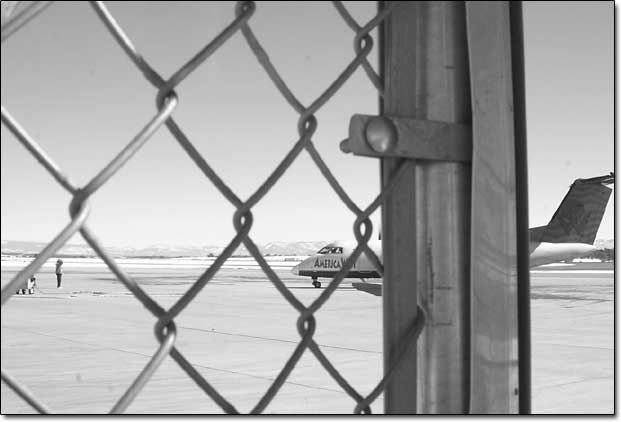|
Business yet to take a big hit from missing Texas
connection
by Amy Maestas
 |
| An America West flight gets
the go-ahead for departure Feb. 14 at the Durango-La Plata
County Airport. Last August, Durango Mountain Resort announced
it would no longer subsidize direct flights between Durango
and Texas. So far, local businesses say the cancellation has
not had a huge impact on tourism./Photo by Todd Newcomer. |
For the first time in more than a decade, winter travelers from
Texas aren’t arriving in subsidized airplane seats as part
of an effort by local business to beef up the winter economy.
But the impact of the loss is still being measured.
In August, Durango Mountain Resort announced it would end its
participation in subsidizing the direct flights, which usually
took place once a week. It’s still the middle of the winter
tourism season, yet DMR and other local businesses report that
so far the lack of flights hasn’t busted the economy. All
kinds of economic indicators are hanging steady, though business
owners agree that the extra flights would have added to what so
far has been a good season.
Scott Fortner, director of marketing at DMR, says that, to date,
the number of skier days is up from the same time last year. He
attributes some of that to a better-than-average snowfall. But
he also says those winter flights from Texas would be a welcome
enhancement.
“Having an air component would definitely boost our numbers,”
Fortner says.
Resort officials, he says, are pleased to see a rise in skier
days, even as they realize they may have lost some visitors because
of the lack of airline service from target markets.
Since the early 1990s, DMR and a handful of other Durango tourism-related
businesses had been ponying up money to help pay for chartered
flights from Dallas and Houston. The intent was to provide nonstop,
easy access for customers rather than see them scurry off to central
Colorado or Utah. It worked, yet not well enough. In recent years,
some business owners stopped participating or failed to pay their
promised share. DMR ended up footing the bill. During the 2001-02
ski season, DMR paid Continental and American airlines a portion
of the cost to bring tourist-laden flights to Durango each week.
By the 2002-03 season, the number of flights had dropped to only
one – the Continental Houston flight. That cost to DMR:
$240,000.
When resort officials realized that business travelers, not tourists,
took the majority – as much as 60 percent – of the
seats, they decided the money could be better spent elsewhere.
“The majority of our skiers are from a drive market,”
says Fortner. That means most people are willing to drive to stay
and ski in Durango instead of taking nonstop flights. Ultimately,
the return to DMR on the subsidies of the flights was negligible.
At this point, there hasn’t been much grumbling by local
businesses who have been or could be impacted by the disappearance
of the flights, though some owners say they are taking a wait-and-see
approach.
“It’s hard to attribute any kind of numbers to flights,”
says Peter Marshall, general manager of the DoubleTree Hotel.
“You have to believe that any additional flights will help.
But you really can’t quantify it.”
Charlie Siegele, ski-rental reservationist for Hassle Free Sports,
says the shop has seen only a slight dip in rentals.
“Last year, when there were the flights coming in, we were
getting maybe only 20 people off of each plane who would rent
skis. And that’s if we were lucky,” he explains. “So,
I would say we have been affected only a little.”
Economic indicators don’t show much either. A couple of
years ago, DMR officials said that the subsidized flights aren’t
just about getting skiers on the slopes. They estimated that for
every dollar spent on the subsidy, visitors spend $6 to $10 at
other businesses. Yet, according to the City of Durango’s
monthly finance reports, lodgers’ tax and sales tax revenues
for December and January are close to par with years past. Additionally,
the number of travel packets the Durango Area Tourism Office has
sent out to interested people is actually up 20 percent.
Still, DMR’s Fortner says those visitors who would come
to Durango because of the subsidized winter flights would be a
boon to the resort’s business, as well as the local economy.
More so, Fortner explains that the additional airlines helped
foster competition among the airlines, and ticket costs were lower.
Marshall says any dip in reservations at the Double Tree might
be related to the axed flights, but he’s not ready to assign
that kind of blame.
“My gut would tell me that the visits associated with skiing
are down.”
Yet, he also says that business travel has “gone slightly
up,” so people are still making it to Durango.
“We should be careful to say that we don’t need those
visitors who would come in on those subsidized flights,”
he adds. “Even though we are doing alright, having those
fliers would make it even better.”
|

